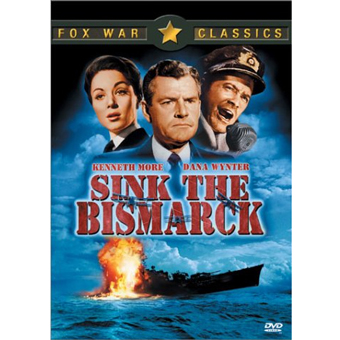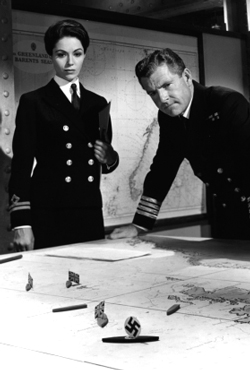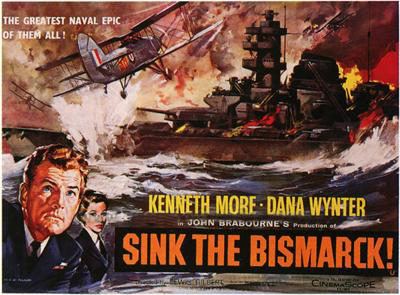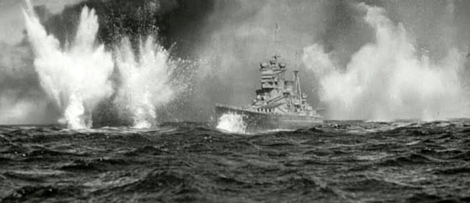| Release List | Reviews | Price Search | Shop | Newsletter | Forum | DVD Giveaways | Blu-Ray/ HD DVD | Advertise |
| Reviews & Columns |
|
Reviews DVD TV on DVD Blu-ray International DVDs Theatrical Reviews by Studio Video Games Features Collector Series DVDs Easter Egg Database Interviews DVD Talk TV DVD Talk Radio Feature Articles Columns Anime Talk DVD Savant HD Talk Horror DVDs Silent DVD
|
DVD Talk Forum |
|
|
| Resources |
|
DVD Price Search Customer Service #'s RCE Info Links |
|
Columns
|
 |
Sink the |

|
Sink the Bismarck! Fox Home Video 1960 / B&W / 2:35 widescreen enhanced / 97 min. / Street Date May 20, 2003 / 14.98 Starring Kenneth More, Dana Wynter, Carl Möhner, Laurence Naismith, Edward R. Murrow, Geoffrey Keen, Karel Stepanek, Michael Hordern, Maurice Denham, Michael Goodliffe. Cinematography Christopher Challis Special Effects Howard Lydecker, Bill Warrington Art Direction Arthur Lawson Film Editor Peter R. Hunt Original Music Clifton Parker Written by Edmund H. North from a book by C.S. Forester Produced by John Brabourne Directed by Lewis Gilbert |
Few movies take on the task of depicting full-scale naval battles between the giant capital ships made somewhat obsolete by air power. In Harms' Way captured some of the drama, if not the realism, of immense battleships engaging in combat on the high seas. Savant's favorite is Michael Powell's Battle of the River Plate, a.k.a. Pursuit of the Graf Spee. It's an exciting tale of the cornering of the German battleship, a surface raider with giant guns that could outshoot anything the British had to offer. Before the Americans entered the war, England had to fight these monsters alone. Built as the pride of a German Navy squandered by Hitler, several of these ships made big news. The British tricked the captain of the Graf Spee into scuttling his own ship, as dramatized in the Powell film. The Tirpitz was harassed and finally sunk in a Norwegian fjord. But the most famous encounter, maybe the most famous sea battle of all time, was the effort to stop the Bismarck in 1941. Sink the Bismarck! is a dramatized account of its pursuit that stays reasonably close to the events, and is an exciting chase on the high seas.

Sink the Bismarck! has some closing text acknowledging that its 'Shepard' character is fictitious, distancing itself from the naval officer who presided over the real events. Apparently the actual man wanted nothing to do with a dramatization of his part, and producer Brabourne proceeded with a true story populated with fictional characters.
This extremely entertaining chase film is something of a throwback; by 1960 the Brits had exhausted patriotic films that replayed war glories, a subgenre put to bed with David Lean's Bridge on the River Kwai. The next year would bring The Guns of Navarone, a post-modern caper film where historical events took a back seat to escapist adventure. Capable writer Edmund H. North (The Day the Earth Stood Still, Patton) clearly delineates the heroics along national lines. The English are stoic automatons, with the human touches reserved for a goldbricking junior officer and a 'rating' who stays on duty when he's down with the flu.
The German Navy was reportedly the least Nazi-fied of the services, but the Bismarck is depicted as the Reich's symbolic showboat, dominated by a party zealot whose idea of Nirvana is a birthday greeting from Der Führer. Within those restrictions and the unfortunate decision to make the Germans speak English, Sink the Bismarck! is superb, a taut thriller that focuses on one easily understood objective and shows the enormous effort made to achieve it.
The able script gets away with having 80% of the story play out in two or three rooms in the underground Naval war complex in London. In one of his best roles, the studiously civilized Kenneth More bandies words with worried superiors like Laurence Naismith and Geoffrey Keen while nursing a growing relationship with his top female staff officer, the dreamy Dana Wynter of Invasion of the Body Snatchers. Wynter gets as much sex appeal out of being a straight-laced officer as Glynis Johns does from her much more feminine roles. It's fun seeing good English actors personify the ideals of English command -- terse, polite orders always delivered with perfect diction and subdued emotion. There's no small talk or jokey banter around this war room; Kenneth More's commanding officer is so capable, he should be running the war. When Moore's self-denied emotions get the best of him, the film's disciplined tone turns a corny little moment into a very warm one.

The articulate speech around the plot map is so entertaining that we hardly notice that important expository points are restated two and three times each. More's son, a naval airman, is stationed on an aircraft carrier that must be pressed into hazardous duty, a fact that North doesn't want us to forget. The higher officers repeatedly express the emotional risks, and More curtly takes the tactical gambles.
The action on board the British ships is as sober as can be imagined, with a half-dozen familiar faces (including Michael Hordern, a wonderful comedian in A Funny Thing Happened on the Way to the Forum) impressing us with their straight-arrow delivery. Most bridges have an easy-to-read ships' name somewhere, helping us landlubbers keep our boats straight. With both sides speaking English, a compromise was found during the ping-pong cutting in the battle scenes: the English officers order their guns to "Shoot!" while the Germans bark out the command, "Fire!" Powell's Battle of the River Platte had a more complicated (and messy) sea battle, but his officers showed a sense of humor fitting a different kind of combat. Not since George killed the Dragon has such a tale been told, and the almost mythical dimensions of the Bismarck pursuit elicit the proper awe. It's great fun. 1
Sink the Bismarck! is perhaps the best-looking naval battle movie. Powell's VistaVision and Technicolor epic for the most part used real ships, and had to shy away from depicting some events. Impressive large models were used for In Harm's Way but Otto Preminger compromised them by insisting that all detail be removed and their waterlines be lowered to an absurd level. Bismarck!'s miniatures were supervised by Republic master Howard Lydecker, probably working under better conditions than ever in his career. The enormous models were shot in large tanks of water with excellent camera work, lighting, smoke, etc. The water sprays from near misses look great, and when the big guns fire, the scale of the smoke isn't bad either. Lydecker doesn't try to position his ships too dynamically - they remain at a distance, and thus resemble shots taken from the credible viewpoint of another ship. 'Optimized' comic book views are a failing of almost all CGI films, where realism is concerned. Sink the Bismarck! reminds us of a sea battle; Pearl Harbor looks like a video game.
Not shooting in color makes it possible to use all manner of stock shots to fill in detail. The coverage of the mechanisms used to reload the giant cannons in the ships is fascinating.
(spoiler)
The end of the Hood is beautifully done. The Germans have just fired a full broadside salvo, and we're presented with a shot that doesn't telegraph the idea that the boat is about to be hit. Plumes of water strike fore and aft of the ship, and then suddenly four or five direct hits land on the Hood itself, which explodes all at once. This miniature shot matches the impact of live action, and for once we share the goggle-eyed reactions of sailors on other ships.
Sink the Bismarck! does a good job of expressing the excitement of such a sea battle, with these giant cannon-studded steel islands blasting away at each other while those manning them direct their actions with unshakable nerve. The actual events of the famous pursuit are exciting enough without exaggeration -- even as the British fleet moved in for the kill, there was no guarantee that the crippled German ship couldn't shoot its way free. The point is stressed, that were it not for a critical lucky hit on the ship's steering mechanism, stopping the Bismarck might have been a hopeless effort -- the boat took several torpedo hits with minimal damage.
Edward R. Murrow, who may have reported the original events from London, makes an appearance as himself and gives the picture his professional blessing. The many small speaking roles guarantee work for practically every familiar non-star face in Actors' Equity. Genre fans will want to be on the lookout for familiar Hammer lackeys Michael Ripper, Michael Balfour, and Sam Kydd as lookouts and civilian workers. Rising faces Ian Hendry (Repulsion) and Edward Judd (Day the Earth Caught Fire) each have brief one-liners as officers.
Fox's DVD of Sink the Bismarck! is a beauty, looking trim and fit in glorious B&W CinemaScope. The lenses used might not have been the best, for some early shots in the war room have a slightly squashed look, as if the anamorphic mechanism wasn't properly set. The miniatures were almost certainly shot flat, and then cropped to 'scope for maximum impact. The image is much clearer and cleaner than on the old laser disc.
Country singer Johnny Horton enjoyed a 1960 hit with his novelty single Sink the Bismarck. He must have had some deal to provide title tunes for Fox pictures, because his singing is prominently featured in the same year's North to Alaska. But, like Gene Pitney and Paramount's The Man Who Shot Liberty Valance, his ballad didn't make it onto the screen for this war picture ... somebody had some sense.
On a scale of Excellent, Good, Fair, and Poor,
Sink the Bismarck! rates:
Movie: Excellent
Video: Excellent
Sound: Excellent
Supplements: trailers, actual newsreel about the battle
Packaging: Keep case
Reviewed: May 18, 2003
Footnote:
1. Favorite exchange from
Battle of the River Plate, communicated between two ships by semaphore: "How did you steam
here so quickly?" "A-n-t-i-c-i-p-a-t-i-o-n!"
Return
2. The rather good website The Battleship Bismarck has more hard facts about the boat and the battle.
Review Staff | About DVD Talk | Newsletter Subscribe | Join DVD Talk Forum
Copyright © MH Sub I, LLC dba Internet Brands. | Privacy Policy | Terms of Use
|
| Release List | Reviews | Price Search | Shop | SUBSCRIBE | Forum | DVD Giveaways | Blu-Ray/ HD DVD | Advertise |






